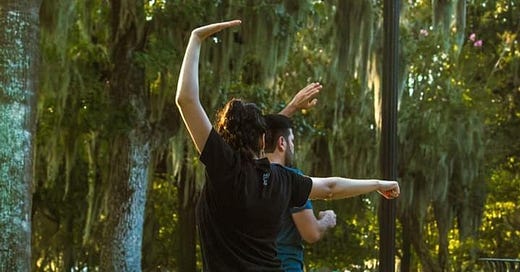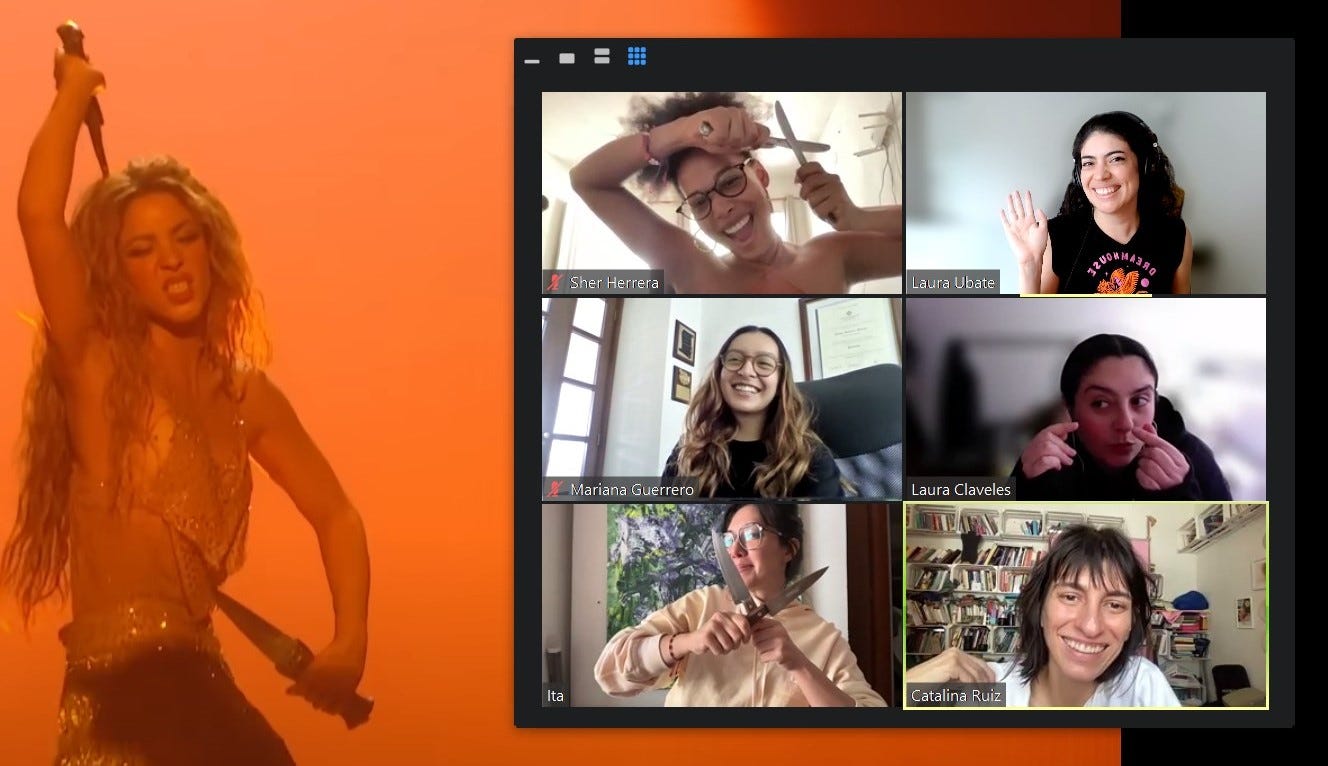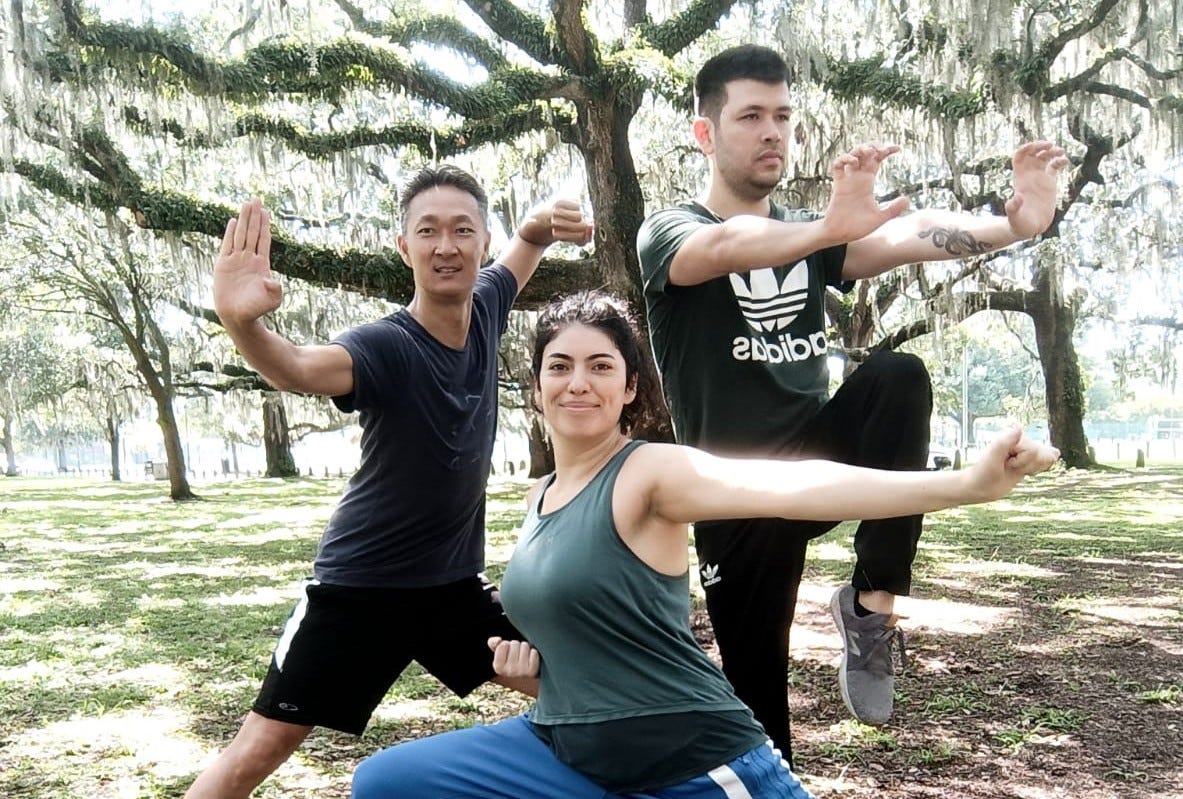Short story: about effort and exhaustion.
In this edition, learn about the world of the martial art of Wushu, about excellence, exigency and the middle ground between the two. Also: Laura facilitates a voiceover workshop for Volcánicas.
It’s time to write out loud.
"It's the end of summer" says the ads outside of the cafes in Georgia. At 35 degrees Celsius, with the sun bursting through my window, to me, summer is still pretty much here. But I’ll give Halloween and pumpkin spice latte promos a point: the air does change. There's something after September 1st that makes something intangible imminent: the year is starting to end, and this is the last race.
So because of that vibe or because in September I’m already listening to new year’s music, this edition of Writing Out Loud is dedicated to the subtle art of measuring the point of effort and the point of tiredness. I'll explain it to you in a little while.
For now, I want to share the highlight of this week: I’m the voiceover teacher of the incredible journalists at Revista Volcánicas. I’m sharing them tricks of breathing, speech tones, projection and all the tools I know for talking in front of a microphone. In the recent session we wrapped up counting how many times did Shakira breathe while singing? we channeled our inner Shaki to cutted all the bad things for good. I love this crowd.
加油, you got this.
One of the best things I have done for myself in the last three months is to get back to practicing martial arts. The story goes like this: I lost my job, went into a vacuum of emotional turmoil and it took me a month to realize that more than losing a paycheck, I lost my enthusiasm. It seemed to me that maybe giving it my best effort, was not a guarantee of anything. On script days, alone with the audio and the blank page, I was always striving to do better and better. A little more action in the text. A little more periods and fewer commas. A little more clarity in the story. More detail, more emotion and again, but better.
Then one fine summer day I decided that I was going to go back to doing everything I love as long as it had nothing to do with my work. That's how I came to Wushu. Well, thanks to someone I came to Wushu. My partner, Nil, has always told me stories about how he trained, about how it was beautiful but very hard to learn and super demanding. At that point the only thing I wanted was to train again, my only ambition was to find the best teacher: Brandon Sugiyama. As fate would have it: I met Brandon at the same art school where Nil studies and it turns out that of all places and all people he is also an animator and does Wushu, just like Nil. I just connected the dots. Wushu is like kung fu but from China. It is composed of two ideograms, "Wu" which is spear (symbolizes War) and another "Shu" (like a hand) that stops the spear. The art that stops violence.
Under the majestic Georgia trees I learned my first arm movements from Brandon. One forward and one back, simple and difficult. I made mistakes and laughed. All good, I was going at my own pace. First I got the feel of kicking back, then I learned to hold my gaze forward by stretching my hands out to the side and side. "The first few times it has to feel like you're sketching a picture," Brandon would tell me. I remembered the feeling of writing my first script. And I'd kick again. "The moment you overthink it is when you stop doing it right."
As the days went by I started to enjoy it. Kick, control. Stance, control. My hand outstretched, control. My hand like a hook, control. I watched Brandon practice as if watching an excellent animation: fluid and steady. The more aware I became of my body, the more I got away from the train of thought. So I kept training.
Eventually, we changed locations and began training in a long corridor of palm trees here in Savannah. Brandon taught me how to spin, lean, drop, and balance. One morning he stood by a palm tree, grabbed his water bottle, and walked to the next palm tree. "We're going to do the repetitions from there to here." From point A to point B. Let’s go. I started doing my first sequences.
I wish I could show you videos of Nil and me moving forward, side by side, doing parallel Wushu postures. The first lights of the sun tearing the silhouette of the trees, the seeds of the palm trees crunching under our shoes, the magnificent silence of the morning, and the corridor of palm trees framing our steps. I noticed that Nil did not strictly reach the second palm tree nor did he start right at the first palm tree, but further ahead. "Hey, this student is doing fewer kicks," I said out loud. And we laughed at the classic "teacher, he's not doing the assignment"complaint. Brandon told me that it didn't matter if Nil was doing fewer reps, the important thing is that I was trying to do a little more. "If you do less just because he does less you are cheating yourself." Two kicks each round trip is going to be eight more in a workout and then it's going to be double that at the end of the week. "Don't cheat yourself". So I stopped paying attention to Nil and focused on my process.
I like martial arts because they put your determination into practice. That's where I was going, doing the sequences from point A to point B but a little bit further. Brandon has this elegant way of correcting by saying "Here's something to think about". Put your foot like this, turn like this, feel your arms over there, and keep going. Do it again.
I kept training, with or without Nil. Then last Sunday I got a definite lesson. Alone, I moved forward concentrating on the quality of the movement and suddenly the perfect figure came out. It was fluid and I felt steady, just as I wanted. I stopped to celebrate and realized that I was quite far from the second palm.
—Oh wow! I'm doing the reps better just when I stop thinking if I get to the palm— I said, wiping the sweat off my face.
—Right—said Brandon—when you're a beginner you have to learn what is the point where you can put a little more energy and you're going to improve the level you have. Only you can feel what that point is.
The point of effort. That point where if you put in more energy, everything you do is going to start to be radically better than your previous attempts. Kung Fu, Nil says, actually means "skill." Jet Lee would tell others that they had Kung Fu because they were determined and strong, not because they knew one technique or another. When you say someone has good Kung Fu it is because you recognize their effort, so one can have excellent Kung Fu writing, but no idea how to fight.
Beginners, Brandon said, are the ones who are finding what that point of effort is. I kept doing the sequences until eventually my kick faltered.
—That kick went wrong —I said.
—It's all right— Brandon said—You're tired. At this point no matter how hard you try, it's not going to pay off.
—What ....?
—You can get hurt. If you make a fist and you're tired you do it half-heartedly and if you repeat it at that point your mind takes over so it reflexively does it wrong. The next time you practice you're going to do it wrong because your brain is going to say "Hey, but that's how we said we should do it".
That's the point of exhaustion. It applies to more scenarios than Wushu, for example: our job.
—Workaholics don't stop when they reach the point of exhaustion.
I told Brandon about journalism. I've seen people in newsrooms reach the point of exhaustion and then work harder and harder until they stop because of an external factor, but rarely because they're tired. Tiredness in journalism I know often fatigue becomes part of the landscape. This one has back pain, this one has been three weeks wih a flu. The boss didn't come today because he had to go to Urgent Care. We're sleepy, so let's go get a coffee.
—All beginner practitioners have difficulty identifying the point of effort. Advanced practitioners are tasked with knowing how to identify that point, where it's best to stop and go to sleep.
Effort, says Brandon, is inversely proportional to your energy. The more effort you put in, the less energy you're going to have on each new attempt. You have to push yourself a little bit, to a certain extent, to raise the bar. But you have to know when to slow down, consciously, before exhausting your energy. It is like the practice of stretching the spear and knowing when to stop it, gently with your hand.
I thought of the many times I conquered excellence over time. And the other times I fell asleep typing. In recent years my greatest achievement is that I learned to put in my effort but also to know when to stop and come back the next day. It's something I learned not in a newsroom, but by doing podcasts. I learned to identify my point of fatigue. My greatest win is to have acquired that awareness. The beauty of narrative podcasts is that each podcast episode is a shared effort, a collective Kung Fu.
I revisited my lack of enthusiasm and realized that it's not that I no longer love my profession. It's that I lost my dojo, my peers, and my practice environment. I had so much fun. I think that's the mourning I'm doing.
The good news is that Kung Fu is not lost because you lose your dojo. It remains, as long as you continue the practice. So now I am a free spear, a freelance, practicing with other partners in other dojos and other accents. It is the beginning of a new path.
I am also learning to cultivate various Kung Fu. So this weekend I'm back to training. And to write out loud, for the sake of good storytelling.
I’ll say goodbye with this little video of me practicing the Wu Bu Quan 五步拳 form. It's not perfect and I don't do it well. That is the point.






